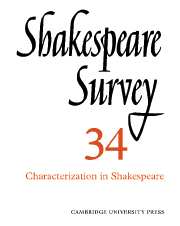Book contents
- Frontmatter
- Shakespeare’s Open Secret
- The Emergence of Character Criticism, 1774–1800
- Society and the Individual in Shakespeare’s Conception of Character
- Realistic Convention and Conventional Realism in Shakespeare
- On Expectation and Surprise: Shakespeare’s Construction of Character
- Shakespeare and the Ventriloquists
- The Rhetoric of Character Construction: Othello
- Characterizing Coriolanus
- The Ironic Reading of The Rape of Lucrece and the Problem of External Evidence
- The Unity of Romeo and Juliet
- No Abuse: The Prince and Falstaff in the Tavern Scenes of Henry IV
- Twelfth Night: The Experience of the Audience
- Plays and Playing in Twelfth Night
- Sceptical Visions: Shakespeare’s Tragedies and Jonson’s Comedies
- Shakespeare in Performance, 1980
- The Year's Contributions to Shakespearian Study 1 Critical Studies
- 2 Shakespeare’s Life, Times and Stage
- 3 Textual Studies
- Index
- Plate Section
The Emergence of Character Criticism, 1774–1800
Published online by Cambridge University Press: 28 March 2007
- Frontmatter
- Shakespeare’s Open Secret
- The Emergence of Character Criticism, 1774–1800
- Society and the Individual in Shakespeare’s Conception of Character
- Realistic Convention and Conventional Realism in Shakespeare
- On Expectation and Surprise: Shakespeare’s Construction of Character
- Shakespeare and the Ventriloquists
- The Rhetoric of Character Construction: Othello
- Characterizing Coriolanus
- The Ironic Reading of The Rape of Lucrece and the Problem of External Evidence
- The Unity of Romeo and Juliet
- No Abuse: The Prince and Falstaff in the Tavern Scenes of Henry IV
- Twelfth Night: The Experience of the Audience
- Plays and Playing in Twelfth Night
- Sceptical Visions: Shakespeare’s Tragedies and Jonson’s Comedies
- Shakespeare in Performance, 1980
- The Year's Contributions to Shakespearian Study 1 Critical Studies
- 2 Shakespeare’s Life, Times and Stage
- 3 Textual Studies
- Index
- Plate Section
Summary
An interest in Shakespeare’s characters is as old as an interest in Shakespeare himself. Among the earliest allusions to his plays in the early seventeenth century we find tributes to the drawing-power of Falstaff, or Hamlet, or Malvolio, and among the earliest pieces of formal literary criticism are praises for his skill in creating characters: in general terms by Margaret Cavendish, Duchess of Newcastle in 1662 (vol. 1, pp. 42 ff.), and more specifically by Dryden in his accounts of Falstaff (vol. 1, pp. 139 ff., 257 ff.) and Caliban (p. 260). Commentary on the characters continued as part of the discussion of a play under the traditional neoclassical categories of action, plot, characters, manners, instruction, diction and so on: we find discussions of varying lengths and subtlety by Rymer, Dennis, Rowe, Gildon, Steele, John Hughes, Lewis Theobald, Warburton, George Stubbes, Joseph Warton, Upton, Kames, and of course Dr Johnson. Such criticism is to be found in the footnotes to editions, in periodical and other essays, all of which give a complete account of the plays.
- Type
- Chapter
- Information
- Shakespeare Survey , pp. 11 - 22Publisher: Cambridge University PressPrint publication year: 1982
- 1
- Cited by

